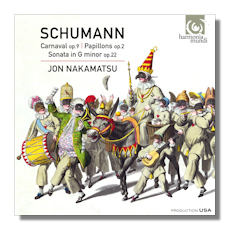
The Internet's Premier Classical Music Source
Related Links
- Schumann Reviews
- Latest Reviews
- More Reviews
-
By Composer
-
Collections
DVD & Blu-ray
Books
Concert Reviews
Articles/Interviews
Software
Audio
Search Amazon
Recommended Links
Site News
 CD Review
CD Review
Robert Schumann

- Piano Sonata #2 in G minor, Op. 22
- Papillons, Op. 2
- Carnaval, Op. 9
Jon Nakamatsu, piano
Harmonia Mundi HMU907503 65min
This is one of the finest Schumann discs in recent memory: Jon Nakamatsu offers a scintillating, elegant take on these works with a wide range of dynamics, a deft sense for the often quirky subtleties in Schumann and with an all-encompassing technique. He uses much rubato, especially in Carnaval, but always with taste and a good sense for the emotional flow of the music.
The first movement of the 2nd Sonata brims with vitality and that epic sense of triumph so essential in Schumann. The ensuing Andantino straddles both the stately and the melancholy in this sensitive rendering, while the brief Scherzo is delightfully joyous and playful. In the finale Nakamatsu brilliantly catches that mixture of breathless busyness and quiet contemplation. Compared with versions of this sonata by Richter and Argerich, I would say Nakamatsu can stand in their company. In fact, I would give him a slight edge over Argerich.
He does well in Papillons too, rightly pointing up the lighter and more playful character in most of these short pieces. Nakamatsu delivers one of the finest versions of Carnaval I've ever encountered. His Préambule appropriately begins in a stately manner; then turns luminously energetic and elegant with well-judged tempos, creamy legato phrasing and perfectly judged dynamics. The ensuing Pierrot is deliciously atmospheric in its somewhat dark depiction of the eponymous commedia dell' arte character: the music actually turns threatening as Nakamatsu gradually plays louder and then faster as he moves toward the end. Nakamatsu offers splendid takes on the next two pieces: Arlequin is both graceful and muscular and the Valse noble is elegant but almost neurotically restless. Eusebius and Florestan, those two characters that signified so much in Schumann's view of his own personality, get sensitive accounts from Nakamatsu here: notice his deft use of rubato and dynamics in conveying the fiery character of Florestan. His Papillons (this is different from the other Papillons on the disc) is breathless and brimming with playful wit, while Lettres dansantes is deftly hesitant and comical. Chopin is appropriately elegant and somber, but also somewhat understated, which is all to the good here. Nakamatsu subtly conveys the quirky character of Reconnaissance, giving the outer sections a sheepish, hesitant character, while the inner portion turns emotionally warmer. In Valse allemande, we again find Nakamatsu playing with such charming effervescence and elegance. In the final and longest piece in this collection, Marche des Davidsbündler contre les Philistins, Nakamatsu begins deliberately and with much gravitas, but soon increases the tempo to offer an exciting close to this brilliant performance.
There have been many fine versions of Carnaval on record, by the likes of Arrau, Kissin, Slenczynska (Ivory Classics 71004), and many others, but, as suggested above, I think this new one by Nakamatsu can stand with the finest renditions of this work. Harmonia Mundi's sound on all tracks is clear and powerful. For Schumann admirers and lovers of 19th century piano music, this disc should be considered a must.
Copyright © 2014, Robert Cummings





















